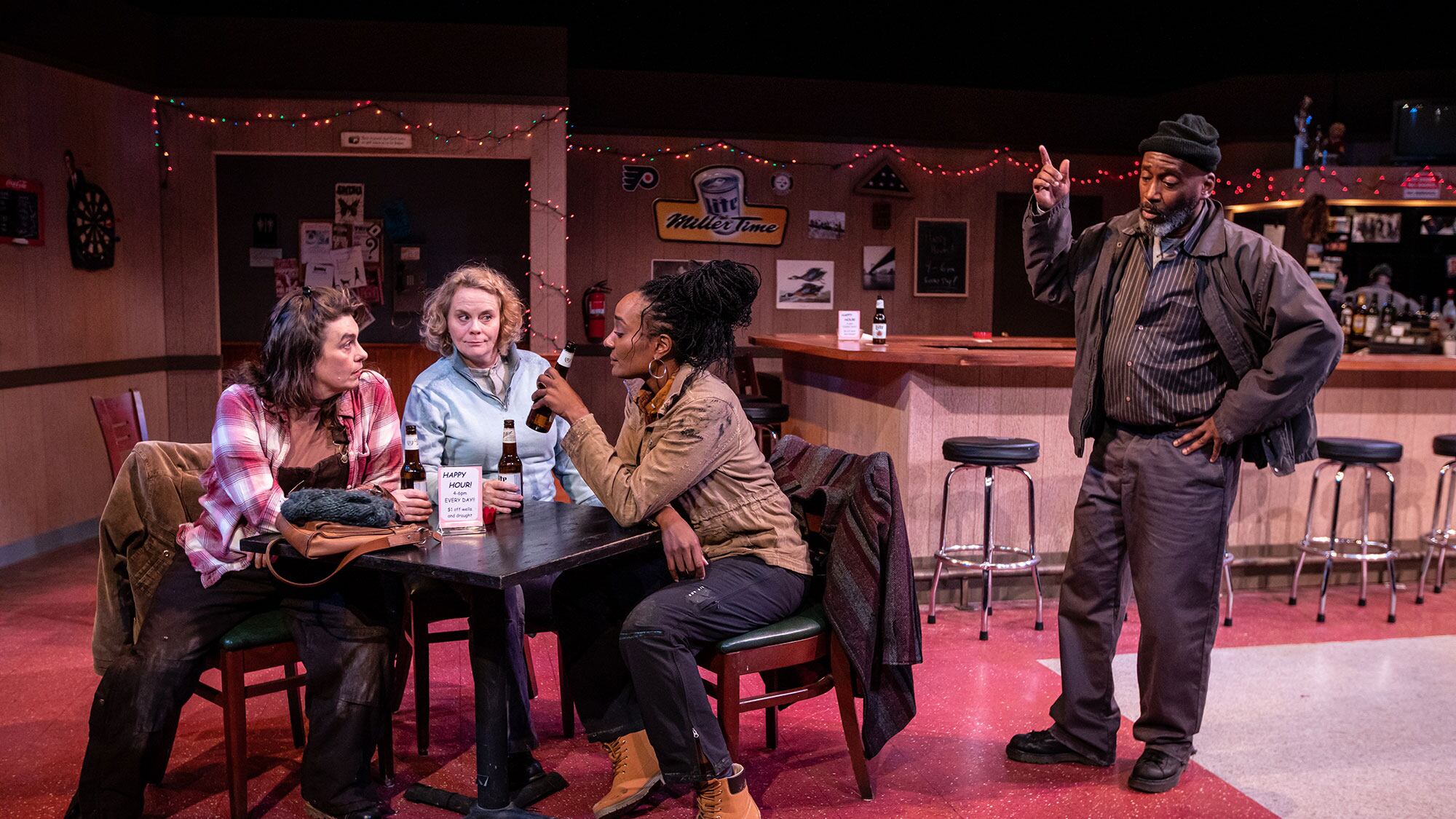"Ran into Chris." "I ran into Jason."
Those lines echo through the opening scenes of Sweat, Lynn Nottage's anguished look at the broken lives of factory workers in Reading, Pa. Chris and Jason are among the first characters we meet in the play and quickly learn that any connection they shared was obliterated by something so terrible that eight years later, they speak of each other in hushed, fearful voices.
If you want to find out what that something is, see Profile Theatre's production of Sweat, which magnifies both the script's potent commentary on racism and class conflict in America and its frustratingly obvious dialogue. Sweat is a paradox—it succeeds completely as an expression of ideas and partially as a work of art. The reactions of audiences will depend on which of those results they deem more important.
Sweat beckons us back to 2000 and into a bar, where employees of a local steel tubing factory talk, drink and fight. The patrons include Chris (La'Tevin Alexander) and his mother, Cynthia (Cycerli Ash), as well as Jason (Jim Vadala) and his mother, Tracey (Linda Hayden), all of whom live in terror of pay cuts and layoffs. When their worst fears materialize, Stan (Duffy Epstein), a bartender, fights to keep his friends from being emotionally and financially pulverized, but his soothing wisdom crumbles in the face of an atrocity that brings the play to a sickening climax.
Nottage shows us scenes from before and after the violence (parts of Sweat take place in 2008), which gives the cast and crew the opportunity to visually evolve the characters in revelatory ways. The production is rife with details that cleverly convey the passing of time, like the way Tracey's suave movements calcify into a painfully stiff walk, or how Cynthia dons a sleek, yellow jacket after receiving a promotion, then ditches it after her success turns out to be a cruel mirage.
Sweat is shaped by the crumbling of Cynthia and Tracey's friendship. Tracey, who is white, resents Cynthia's promotion partly because she is black ("I betcha they wanted a minority," she grouses). Yet Nottage is not without compassion for Tracey and Jason (who tumbles into the sordid underworld of white supremacy), and the greatest evil in Sweat is the greed of the unseen elites who depend on working-class Americans remaining divided by the color of their skin—and therefore unable to unite against their common enemy.
Nottage has a tendency to burden some of her characters with explanatory speeches peppered with blunt wisdom, especially Stan, who gets stuck with groaners like, "I watch these politicians talking bullshit and I get no sense that they even know what's going on beyond the windshields of their cars as they speed past." Clunky dialogue isn't inherently bad, but in this case, it eats away at the humanity of the characters, making them seem less like people and more like a playwright's mouthpieces.
Yet Sweat is not to be dismissed. When we finally understand the consequences of the conflict between Chris and Jason, the scope of Nottage's vision hits you with the force of a tornado. The final scene is a haunting encounter rich with horror and idealism, showing us the dimensions of the system that has dehumanized the characters, while finding hope for all the Chrises and Jasons of America.
Many things from Sweat stay branded in your memory, but few linger like Alexander's impassioned gesturing, which suggests Chris is trying to mold the world into a shape that makes moral sense to him. That's why the play is moving despite its flaws—there is the suggestion that perhaps one day, either he or someone like him could succeed in doing just that.
SEE IT: Sweat is at Imago Theatre, 17 SE 8th Ave.,
profiletheatre.org. 7:30 pm Thursday-Saturday, 2 pm Sunday, through Feb. 2. $20-$40.
